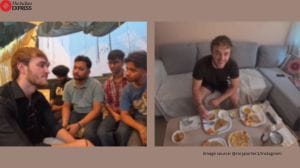SC to hear pleas against BBC documentary ‘ban’; Rijiju says ‘waste’ of court time
The PIL claimed that the ban on the documentary was arbitrary and unconstitutional and also called for investigation into those responsible for failing to contain the riots, according to Bar and Bench
 The Supreme Court Monday said it will list a PIL challenging the “ban” on the BBC documentary (Photo: AP)
The Supreme Court Monday said it will list a PIL challenging the “ban” on the BBC documentary (Photo: AP) THE SUPREME Court said Monday that it will list for hearing on February 6 a PIL challenging the “ban” on the BBC documentary ‘India: The Modi Question’. It also agreed to list for hearing a related plea seeking the quashing of “all orders directly or indirectly censoring” the documentary, including one by the Government “directing Twitter India to block 50 tweets with link to YouTube videos” on it.
The PIL was filed by Advocate M L Sharma who mentioned it before a bench presided by Chief Justice of India D Y Chandrachud. As Sharma pressed for an urgent hearing, saying people were getting arrested, the CJI made it clear that it will come up on February 6 and told the counsel, who is known to be a serial PIL litigant, that “you can speak to the social media from elsewhere”.
The bench, also comprising Justices P S Narasimha and J B Pardiwala, later agreed to list for hearing the related petition, which was filed by journalist N Ram, TMC MP Mahua Moitra and Advocate Prashant Bhushan.
Tagging a news item on the related petition, Union Law Minister Kiren Rijiju wrote on Twitter, “This is how they waste the precious time of Hon’ble Supreme Court where thousands of common citizens are waiting and seeking dates for justice”.
In another tweet, Rijiju wrote: “For how long false propaganda can sustain? The matter is settled & set aside by the highest Court of India. What is the motive of these kind of people? What is their objective? Is Supreme Court of India supreme or BBC? India has moved much beyond this colonial mindset…”
The documentary focuses on Modi’s and his then state government’s response to the 2002 Gujarat riots.
On January 20, the Centre ordered YouTube and Twitter to take down links sharing the documentary with officials saying it has been found to be “undermining the sovereignty and integrity of India” and has “the potential to adversely impact” the country’s “friendly relations with foreign states” and “public order within the country”.
Sharma’s PIL also sought quashing of the January 20 order claiming it is “illegal, malafide, arbitrary and unconstitutional.” It wanted the court to examine the documentary and act against persons who were directly and indirectly responsible for the 2002 Gujarat riots.
The related petition points out that Bhushan and Moitra had tweeted about the documentary on January 19 and January 22, respectively, sharing links of the URLs where it could be found. However, it said, Bhushan’s tweet was blocked and the link to the URL shared by Moitra removed after the January 20 direction issued by the Secretary, Information & Broadcasting Ministry.
The Secretary had issued the directions in his capacity as Authorised Officer under Rule 13(2) of The IT Rules 2021, it said, adding this is prima facie illegal as the directions “are in direct contravention of” an interim order of the Bombay High Court.
The petitioners in the related plea said the Government has not officially placed any document/ order or any other information in the public domain “which explains the reasons for the need to exercise its emergency powers… rather than any other mechanism provided in the rules”. It said the Ministry “has chosen expediency over necessity and proportionality in their response to the documentary”.
It said the “contents of the BBC Documentary and the tweets by” Bhushan and Moitra are protected under Article 19(1)(a) of the Constitution, which guarantees freedom of speech and expression. “…the contents of the documentary series do not fall under any of the restrictions specified in Article 19(2) or restrictions imposed under Section 69A of the IT Act, 2000”, it said.
The petitioners contended that the Supreme Court had in the past “categorically laid down that criticism of the Government or its policies or even the judgment of the Supreme Court…does not tantamount to violating the sovereignty and integrity of India”.
“All citizens including the press have the fundamental right to view, form an informed opinion, critique, report on & lawfully circulate the contents of the documentary as right to freedom of speech and expression incorporates the right to receive and disseminate information,” it said.
It said “censoring the freedom of speech and expression of the petitioners by the Executive through opaque orders and proceedings is manifestly arbitrary as it frustrates the fundamental right of petitioners to effectively seek judicial review of administrative actions under Article 226 and Article 32 of the Constitution…in violation of the Basic Structure…”







